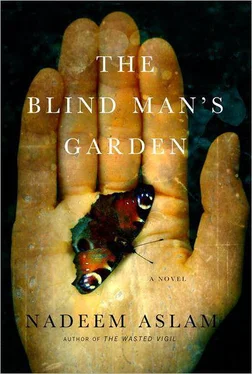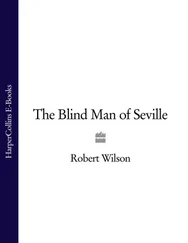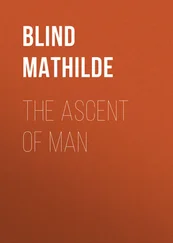Mikal does as he is told, the MP unlocking his handcuffs, and David and the interpreter leave the room, the MP remaining in his corner.
*
Half an hour later David returns and tells Mikal to sit back on the chair, his wrists locked again.
David indicates the Twin Towers poster. ‘If you think we will let you repeat what you did five months ago you are severely mistaken.’ And then, holding Mikal’s eye, he says, ‘How did you feel when it happened?’
‘It was a disgusting crime.’
‘Most of your people didn’t think so. They were pleased.’
‘Now you know we don’t all think alike.’ The man’s eyes have not left his for even a fraction of a second. ‘How many of my people have you met anyway?’
‘I have met enough of them here.’
‘Do you want me to base my opinion of your people on the ones I have met here?’ Let him ask me to get on my knees and stick my arms out .
David leans back in his chair. ‘You wanted us to ask Jeo about something only the two of you would know. He has given us one word.’
The man utters the word and it travels through Mikal, journeying along his blood vessels and then something ruptures in his mind. He is feeling weightless suddenly, what the arrow must feel when it leaves the bow. The muscles of his arms are in indescribable pain from having been in the stress position, and before that there were the ceiling shackles in the chamber, and yet he lunges at David across the table with his teeth bared, his only weapon — the animal part of him.
Naheed.
I curse this city. Its king erred in killing the man I love … She looks up from the page she has been reading and then closes the book. She has imagined an arrival, the presence of someone on the other side of the front gate. Perhaps there was even a knock. She emerges onto the terrace and gazes at the gate through the trees, surrounded by the natural noises of the garden. The ashes on her clothes deposit an indistinct impression on the white pillar beside her. These half-ghosts appear elsewhere in the house too, as she brushes against a wall in passing or forgetfully leans against a cupboard for support. They are faint — only she can see them — and as with the others she will brush this one away soon after becoming aware of it.
It is the first morning of steady heat this year, and she sits down on the stone steps. She opens the book on her lap and begins to read. Shilappadikaram . A text from the third century AD. The story of Kannagi who, having lost her husband to a miscarriage of justice at the court of the Pandya king, wreaked her revenge on his kingdom. When she looks up the gate has opened to admit Mikal.
His eyes locate her.
The jacaranda is in bloom and after a shower the smell enters the house at twilight so thickly she can lie there wondering if it will ever stop. It marks half the distance between Mikal and her, and she halts when she reaches it. Is it his ghost, here to convince her to build a life without him? Or is he real and her thinking has summoned him into her presence?
She backs away and he takes a corresponding step towards her.
‘When someone thinks of us, or dreams of us with enough longing and love,’ Tara had said to her once, ‘we disappear from where we are.’ Naheed had become afraid lest she think about Mikal strongly enough to make him appear in the room, unable to explain to Tara who he was.
She turns and begins to walk away, looking over her shoulder to see him following her. But when she reaches the terrace he is no longer behind her. She had taken a sideways step on approaching the walnut tree, and it is as though he had continued in his momentum and disappeared into the bark.
She touches the tree trunk.
She waits for him to emerge for ten, fifteen, twenty seconds, and then she looks around, searching inside the light that breathes down everywhere through the canopies, her glance passing over the mulberries that have both foliage and flowers on their branches now, the thick softness of the leaves gleaming amongst all the other greens of the garden, the banyan’s wide clear green, the cypresses almost black in comparison, the apple-green poplars. Eventually she sees him standing next to the peepal tree near the far boundary wall. She imagines him ascending through this trunk and then travelling along the joined crowns overhead to enter the peepal. Or perhaps he had gone down into the earth and walked through all the darkness and soil, the roots like wooden bolts of lightning around him, and then risen into the peepal.
As Basie and Yasmin come into the school, Father Mede stands at the window of his office and watches them. They are walking as close together as propriety allows in this land that is both less and more innocent than any other. They are lit by the March sunlight that is thick as felt. As a child he used to wonder why Eve was taken from Adam’s rib. Now, at the other end of his life, these decades later, he knows it was because the rib is close to the heart. Both Basie and Yasmin have lost a brother and he can see that they have yet to recover, if they ever will. He doubts whether he has been able to express his feelings to them adequately. He held each of them in turn and just repeated the two or three phrases humans have for grief. Two thousand years have passed since man became brother to every other man on the planet, and yet words remain uninvented for the alleviation of certain burdens.
*
‘Who is that young man on the cypress path?’ Yasmin asks, as she passes by Father Mede’s office. ‘Good morning, Father.’
‘Good morning, Yasmin,’ he looks up from the letters stacked on his desk. ‘Could it be one of the gardener’s helpers?’ Father Mede walks to the door and looks out towards the cypress trees. ‘He sometimes brings in his grandsons.’
The sky is a blue so clean it verges on joy.
‘He’s gone,’ Yasmin says. ‘He was there a minute ago.’
‘Must be the gardener’s grandson.’
Children are coming in through the gate to begin the school day, the girls in white with red sweaters, the boys all in navy. And He placed at the east of the garden of Eden cherubim, and a flaming sword which turned every way, to keep the way to the tree of life …
He looks at Yasmin. ‘You are wearing your mother’s watch.’
She glances at it.
‘It cost her two hundred and fifty rupees,’ he continues. ‘She purchased it with her first pay cheque, the late 1960s. She came here to show it to me, I still remember. She said she had done a hundred and fifteen rupees’ worth of shopping at the Army Canteen Stores. Biscuits. Coffee. Condensed milk. Chocolates. All the luxuries. And the Favre-Leuba watch.’ Father Mede taps the dial. He smiles. ‘And from the look on your face it is obvious that I have told you this many times before.’
Yasmin puts her arm into his and walks into the office with him. ‘How was your trip?’
‘Tiring.’
‘You are getting old.’
‘I don’t feel old. I just feel like someone young who has something wrong with him.’ He settles in his chair. ‘How is your father?’
She looks away for half a moment.
Father Mede nods. ‘I wish him well.’ Rohan had requested that Father Mede stay away from his house while he dealt with Sofia’s crisis of faith, had asked Sofia not to see him. The fracture was never really mended. ‘Is that ash on your sleeve?’
Yasmin tries to brush the small mark away. ‘My sister-in-law.’
‘The Greeks maintained we sprang from ash.’
‘This tunic belonged to my mother.’
‘I know.’
As she is about to leave, he indicates the paperwork that has accumulated on his desk in his absence. ‘You and Basie must spare an hour to help me deal with some of this.’
Читать дальше












